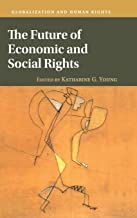 Editor: Katherine G. Young
Editor: Katherine G. Young
Publisher: Cambridge University Press – 683 pages
Book Review by: Sonu Chandiram
Economic and social rights are an important par, yet often overlooked part of the wide range of human rights, contends the editor of this book Katherine Young. But here is the present and past situation with them, she points out – they are essentially:
- Neglected within the human rights movement
- Avoided by courts
- Subsumed with a single-minded conception of development as economic growth, economic and social rights faced an uncertain status in internal human rights law and in the public laws of most countries
She elaborates: “Today, under conditions of immense poverty, insecurity and political instability, the rights to education, health care, housing, social security, food, water and sanitation are central components of the human rights agenda.”
In this important, insightful, and highly valuable book on the economic and social rights of people living the world over, Professor Young presents some examples of how such rights are not realities, even as they form part of international human rights law.
Under her leadership, guidance and supervision, 31 specialists in economic and social rights, from all over the United States and nine other countries – Argentina, Australia, Canada, Colombia, France, India, Norway, South Africa, and the United Kingdom – discuss the various issues at length in this work of nearly 700 pages. We provide you a broad overview of its contents below:
- Introduction
- Part I – Adjudication and Rights: Global Trends
- Justiciable and Aspirational Economic and Social Rights in National Constitutions
- Judicial Politics and Social Rights
- Constitutional Non-Transformation? Socioeconomic Rights Beyond the Poor
- Part II – Education and Rights in Context: Two Contrasts
- The Right to Education in the American State Courts
- Legislating Human Rights: Experience of the Right to Education Act in India
- Part III – Education and Rights: Democracy and Courts
- The Participatory Democratic Turn in South Africa’s Social Rights Jurisprudence
- Why Do We Care about Dialogue? ‘Notwithstanding Clause’. ‘Meaningful Engagement’ and Public Hearings: A Sympathetic but Critical Analysis
- Empowered Participatory Jurisprudence: Experimentation, Deliberation and Norms in Socioeconomic Rights Adjudication
- Courts and Economic and Social Rights / Courts as Economic and Social Rights
- Part IV – Economic and Social Rights in Retrenchment: Past and Future
- The Future of Social Rights: Social Rights as Capstone
- The Present Limits and Future Potential of European Social Constitutionalism
- Canada’s Confounding Experience with Human Rights Litigation and the Search or a Silver Lining
- Universal basic Income as a Social Rights-Based Antidote to Growing Economic Insecurity
- Part V – Economic and Social Rights in Development: Local and Global Trajectories
- Rights as Logistics: Notes on the Right to Food and Food Retail Liberalization in India
- Human Rights, Investment, and the Rights-ification of Development: The Practice of ‘Human Rights Impact Assessments’ in Large-Scale Foreign Investments in Natural Resources
- Human Rights Testimony in a Different Pitch: Speaking Political Power
- Grassroots Lawfare: How South Africa’s Urban Poor Use Land as a Legal Instrument
- Part VI – Rights and Accountability: Emerging Doctrines, Evolving Concepts
- Public Budget Analysis for the Realization of Economic, Social and Cultural Rights: Conceptual Framework and Practical Implementation
- Bridging the Gap: The Evolving Doctrine on ESCR and ‘Maximum Available Resources’
- Waiting for Rights: Progressive Realization and Lost Time
In sum, this book provides not only an extensive broad brush yet intensive look of the past and present condition of the economic and social rights of humans worldwide, it is also a forecast of what we can expect to see in the future in this area.
Editor:
Katherine G. Young is Associate Professor of Law at Boston College Law School. She has published widely in the fields of public law, human rights and constitutionalism and is the author of Constituting Economic and Social Rights (2012) and editor of The Public Law of Gender (2016) with Kim Rubenstein. She completed her doctorate in law at Harvard University and was a fellow at Harvard’s Justice, Welfare and Economics program.






